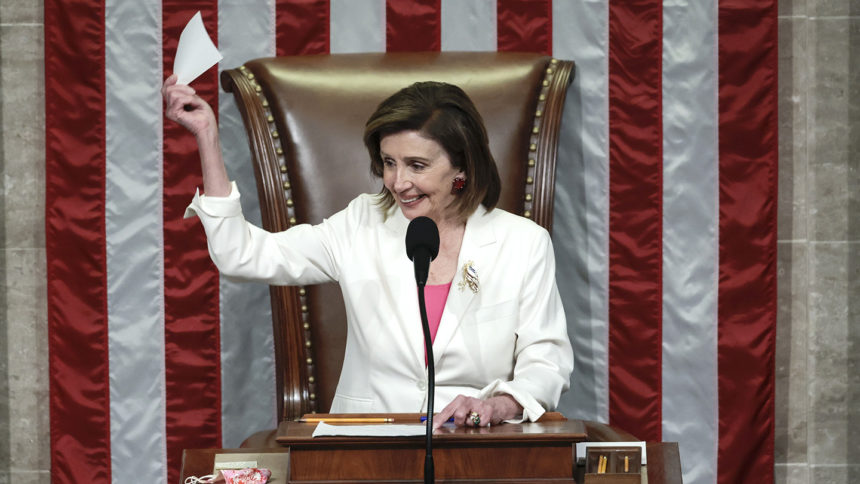
Speaker of the House Nancy Pelosi (D-CA) presides over the vote for the Build Back Better Act at the U.S. Capitol. (Credit: Anna Moneymaker / Staff/Getty Images)
It’s an affront to assisted living. It’s a bill that contains some “noteworthy” items for senior living providers and those they serve yet reveals that “there is still more work to be done.” It’s a “major step forward for millions of older Americans.” And it’s legislation that “threaten[s] access to care for millions of people.”
Characterization of the Build Back Better Act, passed 220-213 by the House of Representatives on Friday morning, varies among industry leaders depending on which areas they are focused on. One point on which they all agree, however, is the need for long-term care leaders to work with lawmakers as the social spending legislation heads to the Senate, to ensure that the final version does more to help the industry.
H.R. 5376, valued at approximately $2 trillion, among other things calls for $150 billion to expand home- and community-based services under the Medicaid program and $150 billion to increase the supply of affordable housing, including $450 million for the Section 202 Supportive Housing for the Elderly program and other investments.
But it is “lacking in one significant, life-and-death way, and that is the fact there is no relief targeted specifically for assisted living caregivers,” Maggie Elehwany, senior vice president of public policy at Argentum, told McKnight’s Senior Living. The bill represents Congress’ continued lack of attention to senior living providers, she said.
“The big picture from [Build Back Better] is that climate change, as an example, is prioritized, but senior living communities are not,” she said. “This fact has to change as the Senate takes up the legislation.”
Argentum said it is working with several senators “who are intent on inserting provisions that have been consistently left behind in other pieces of legislation.”
David Schless, president of the American Seniors Housing Association, agreed that “While the House-passed bill is expected to largely serve as the basis for Senate deliberations over the next several weeks, there is still more work to be done.”
He noted that the Build Back Better Act “calls for significant investments in programs that impact low-income seniors, the workforce, children, affordable housing and the environment” but said that ASHA “has been actively urging Congress to improve upon some of these investments.”
Areas especially of interest, Schless said, are the Medicaid expansion of HCBS and various workforce development grant programs, he said.
“The HCBS expansion will benefit those senior living operators who choose to participate in the Medicaid waiver program, and we are working to make sure the option of assisted living as an eligible setting is secure as the bill moves to the Senate,” he said.
And although Schless said that ASHA was disappointed that the bill’s workforce development grant program to train, recruit and retain a direct care workforce is not available to senior living operators that may wish to develop such programs, he added, “We will continue to stress the importance of inclusion as we continue to lobby the Senate on this point.”
The legislation, however, does include additional funding for the Department of Labor-registered apprenticeship programs that have been used by the senior living industry, Schless said.
And although the bill does not contain COVID-19-related relief, he said, “some of the other investments can be helpful to our industry if it allows caregivers and others to remain in the workforce, such as the universal pre-K funds and childcare benefits.”
The legislation also increases the low-income housing tax credit, Schless said, noting that the credit “has historically been a significant source of affordable housing, including seniors housing, in this country.”
Also noteworthy, he said, is that the bill would permanently extend the protection against spousal impoverishment for individuals whose partners receive Medicaid HCBS, a position he said that ASHA has supported for a long time.
Katie Smith Sloan, president and CEO of LeadingAge, called Friday’s House vote “a major step forward for millions of older Americans.” She pointed to provisions in the bill related to HCBS, affordable senior housing and staffing issues.
“Support for home- and community-based services and affordable senior housing programs in the Build Back Better legislation can fundamentally transform how people grow old in this country,” Sloan said. “These are critically needed resources — especially investments in workforce — that will immediately help alleviate current shortages and scarcity across aging services.”
But she called for increased investments in affordable senior housing.
“The Senate’s job is clear: to adopt these investments without shaving off one dollar, and indeed to increase them — by at least doubling support for the Department of Housing and Urban Development’s Section 202 Supportive Housing for the Elderly program for very low income older adults,” Sloan said. “Waiting lists for affordable housing are growing. Without a safe place to live, older adults won’t be able to access the community-based care and services the legislation provides.”
American Health Care Association / National Center for Assisted Living President and CEO Mark Parkinson said the organizations hope the Senate removes two provisions in the Build Back Better Act that “threaten access to care for millions of people.” Both provisions affect nursing homes.
“The two unfunded staffing mandates for nursing homes, the minimum staffing provision and the 24-hour RN requirement, are fatally flawed,” he said. “Both are impossible to comply with because the workers simply are not there. Both are impossible to comply with because there is no funding to help providers recruit and retain the necessary workforce.”
If the Senate version of the bill contains the provisions, Parkinson said, then “the future of the long-term care for the most vulnerable in our country is at risk.”
Argentum expects the legislation “to undergo significant revisions” in the coming weeks to gain the support of the 50 senators needed for passage in that body. If it is altered, then another House vote would be required.



